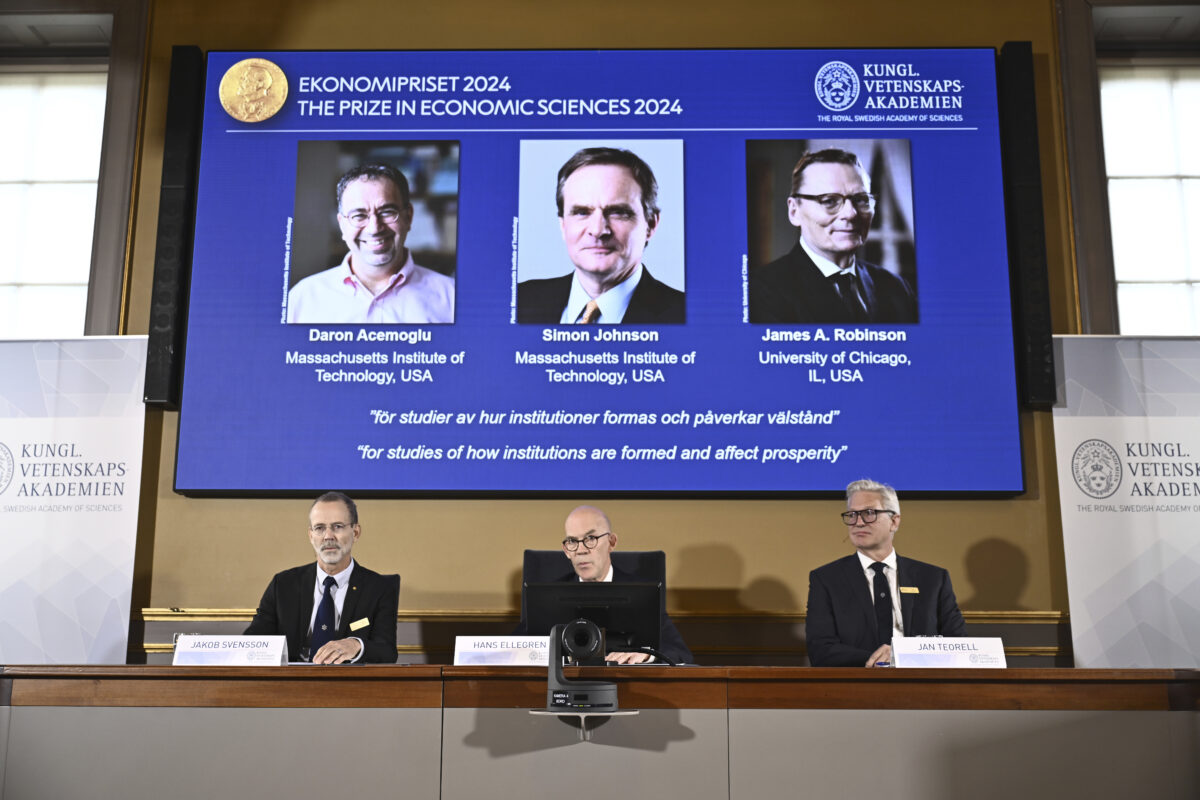Trio wins economics Nobel for work on wealth inequality

Academy of Sciences permanent secretary Hans Ellegren, center, Jakob Svensson, left, and Jan Teorell, of the Nobel assembly announce the Nobel memorial prize in economics winners, Daron Acemoglu, Simon Johnson and James A Robinson, seen on screen, during a press meeting at the Royal Swedish Academy of Sciences in Stockholm, Sweden, Monday Oct. 14, 2024. (Christine Olsson/TT News Agency via AP)
STOCKHOLM, Sweden – The Nobel prize in economics was awarded on Monday to Turkish-American Daron Acemoglu and British-Americans Simon Johnson and James Robinson for research into wealth inequality between nations.
By examining the various political and economic systems introduced by European colonizers, the three have demonstrated a relationship between societal institutions and prosperity, the jury said.
“Reducing the vast differences in income between countries is one of our time’s greatest challenges,” Jakob Svensson, chair of the Committee for the Prize in Economic Sciences, said in a statement.
“The laureates have demonstrated the importance of societal institutions for achieving this,” Svensson added.
Acemoglu, 57, and Johnson, 61, are professors at the Massachusetts Institute of Technology (MIT).
Robinson, 64, is a professor at the University of Chicago.
The jury highlighted the laureates’ work in illuminating how political and economic institutions play a role in explaining why some countries prosper while others do not.
“Although the poorer countries are, of course, becoming richer, they’re not closing the gap,” Jan Teorell, a professor of political science and member of the award committee, told a press conference.
“Acemoglu, Johnson and Robinson have shown that a large part of this income gap is due to differences in economic and political institutions in society,” Teorell said.
‘Inclusive institutions’
In a statement explaining the prize, the jury noted the example of the city of Nogales, which is divided by the US-Mexican border, where residents on the US side of the city tend to be better off.
“The decisive difference is thus not geography or culture, but institutions,” the Royal Swedish Academy of Sciences said.
The US economic system provides residents north of the border greater opportunities to choose their education and profession, and they are part of the US political system, which gives them broad political rights.
By contrast, south of the border, residents live under other economic conditions, and the political system limits their potential to influence legislation.
In addition, the jury noted that the laureates’ research also helped explain why some countries become trapped in a situation of “low economic growth.”
The Academy said differences between nations could be traced back to the institutions built up by colonial powers.
It said that “in some colonies, the purpose was to exploit the indigenous population and extract natural resources to benefit the colonizers,” which would provide only “short-term gains for the people in power”.
In others, colonial powers “built inclusive political and economic systems,” which would “create long-term benefits for everyone.”
So “institutions that were created to exploit the masses are bad for long-run growth.”
Conversely, “ones that establish fundamental economic freedoms and the rule of law are good for it.”
Acemoglu, who was “delighted” to receive the award, told reporters that the “work that we had done favors democracy.”
‘Substantial gain’
Speaking via telephone from Athens as the award was announced in Stockholm, Acemoglu said that the economies of “countries that democratise, starting from a non-democratic regime” grow faster than non-democratic regimes.
“And it’s a substantial gain,” Acemoglu said.
He acknowledged nonetheless that “democracy is not a panacea” and “introducing democracy is very hard”.
Acemoglu, the author of several best-sellers including “Why Nations Fail: The Origins of Power, Prosperity, and Poverty”, was considered a top name for the prize this year.
The economics prize wraps up this year’s Nobel season, which honored achievements in artificial intelligence for the physics and chemistry prizes, while the Peace Prize went to Japanese group Nihon Hidankyo, committed to fighting nuclear weapons.
South Korea’s Han Kang won the literature prize — the only woman laureate this year — while the medicine prize lauded discoveries in understanding gene regulation.
The Nobel Prizes consist of a diploma, a gold medal and a $1 million reward and winners will receive their awards at ceremonies in Stockholm and Oslo on December 10, the anniversary of the 1896 death of scientist and prize creator Alfred Nobel.